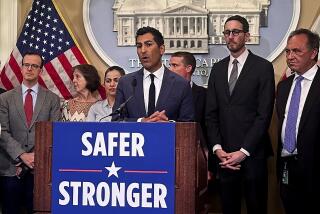Senate to Debate Small-Business Liability Bill
- Share via
The Senate on Tuesday agreed to start debate on controversial product-liability legislation designed to protect companies and manufacturers from abusive and costly lawsuits.
The Senate, on a 71-24 vote, ended the procedural maneuvering that had stalled progress on the bill, which would place a limit on punitive damage awards against small businesses accused of making faulty products.
Under a compromise bill supporters reached with the White House, punitive awards would be limited to no more than twice the amount of economic damages or $250,000, whichever is smaller.
The cap would apply only to businesses with no more than 25 employees and less than $5 million in annual revenue. It also would apply to local governments and individuals with net worth under $500,000.
In order to receive punitive damages, plaintiffs would have to show “clear and convincing evidence” that a company acted with “a conscious, flagrant indifference to the rights or safety of others.”
The bill also would limit the liability of product sellers, holding them liable only for their own intentional wrongdoing, not that of manufacturers.
The bill would require lawsuits to be filed within two years of when a consumer discovered, or should have discovered, the damage. Consumers would have 18 years to file lawsuits over injuries caused by most workplace equipment in cases in which they have received, or are eligible to receive, workers’ compensation.
Congress passed a tougher bill limiting product liability damages in 1996, but President Clinton vetoed it, saying it did not protect consumers.
In a meeting with reporters before debate began, Senate Majority Leader Trent Lott (R-Miss.) said he and other conservatives don’t think the compromise goes far enough, but he will support it.
“It’s a question of how much we can get,” Lott said. “This is all that was achievable.”
The bill’s Democratic opponents have said it would undermine protections for consumers who should be fully compensated for sometimes devastating injuries.
Consumer advocate Ralph Nader called it “a disgraceful effort to subvert our civil justice system, allowing corporations to escape financial responsibility for the harm and damage they cause innocent citizens.”
(BEGIN TEXT OF INFOBOX / INFOGRAPHIC)
Key Provisions of the Bill
* Limits punitive damages a plaintiff can receive to cases where consumers can show clear and convincing evidence that they were harmed by a manufacturer’s conscious and flagrant indifference to the safety of others.
* Sets a cap of $250,000 on punitive damages on small businesses (those with 25 or fewer employees and with annual revenue of less than $5 million).
* Limits liability of retailers; they can no longer be sued for selling a defective or dangerous product unless they’re negligent or the manufacturer has gone out of business.
* Bars damage awards for consumers if alcohol or illegal drug use was found to be at least 50% responsible for the harm.
* Maintains the ability of consumers to seek damages for pain and suffering from several defendants.
* Prevents lawsuits against a product more than 18 years old if it’s a durable good used in a workplace where the injured worker is eligible to receive workers’ compensation.
* Permits consumers to file suits within two years of the date that the consumer discovered the harm’s cause.
* Does not cover litigation involving tobacco products or silicone breast implants.
* Limits liability for makers of raw materials and components used in medical implants.
* SENATORS BLAST MEASURE: Both California senators attacked the bill, saying gun makers shouldn’t be granted protection. A15
More to Read
Inside the business of entertainment
The Wide Shot brings you news, analysis and insights on everything from streaming wars to production — and what it all means for the future.
You may occasionally receive promotional content from the Los Angeles Times.










